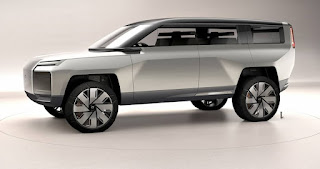Comparing SUV Sizes:
Compact, Midsize, and Full-Size SUVs Explained
In the world of SUVs, one size doesn't fit all. Understanding the differences between compact, midsize, and full-size SUVs can help you choose the right one for your needs. In this comprehensive guide, we'll delve into the details of each SUV category to help you make an informed decision.
Introduction
SUVs, or Sport Utility Vehicles, come in various sizes, each catering to different preferences and requirements. Whether you're a solo commuter, a family-oriented driver, or an adventure enthusiast, there's an SUV size that suits you perfectly. In this blog post, we'll break down the differences between compact, midsize, and full-size SUVs, highlighting their key features, benefits, and considerations.
1. Compact SUVs: Nimble and Efficient
Compact SUVs offer a blend of versatility and efficiency, making them a popular choice for urban commuters and small families.
Key Characteristics:
Compact footprint, ideal for city driving and tight parking spaces.
Better fuel efficiency compared to larger SUVs.
Adequate cargo space for daily needs and occasional trips.
Typically more affordable than larger SUV categories.
Pros:
Easy maneuverability in crowded urban areas.
Good fuel economy for budget-conscious buyers.
A spacious and comfortable interior for small families.
Lower purchase price and ownership costs.
Cons:
Limited cargo space for large hauls or family vacations.
May not have the same towing capacity as larger SUVs.
Less room for passengers compared to midsize and full-size counterparts.
2. Midsize SUVs: The Versatile Family Option
Midsize SUVs strike a balance between compact and full-size models, offering ample space and versatility for families and individuals alike.
Key Characteristics:
Spacious interior with generous legroom and cargo capacity.
Capable of towing larger loads, making them suitable for outdoor enthusiasts.
Versatile seating configurations for accommodating passengers and cargo.
A good compromise between efficiency and space.
Pros:
Comfortable seating for up to seven passengers.
Expanded cargo space for road trips and family vacations.
Strong towing capacity for boats, trailers, and recreational equipment.
Enhanced safety features and technology options.
Cons:
Slightly reduced fuel efficiency compared to compact SUVs.
May feel bulkier to drive in urban settings.
Higher initial purchase price and operating costs.
3. Full-Size SUVs: The Ultimate in Space and Power
Full-size SUVs are designed for those who require maximum interior space, towing capabilities, and a commanding presence on the road.
Key Characteristics:
Spacious third-row seating, accommodating up to eight passengers.
Exceptional cargo capacity, making them ideal for large families.
Robust towing capabilities, capable of handling heavy trailers and boats.
Powerful engine options for confident highway driving.
Pros:
Abundant space for passengers and cargo.
Unmatched towing capacity for trailers and recreational vehicles.
High-level luxury features and options.
Commanding road presence and enhanced safety.
Cons:
Lower fuel efficiency, especially with larger engines.
Challenging maneuverability in tight spaces.
Higher purchase price and operational costs.
Choosing the Right Size for You
Selecting the ideal SUV size depends on your lifestyle, driving needs, and budget. Consider the following factors when making your decision:
Usage: Determine whether you primarily use your SUV for daily commuting, family transportation, or towing.
Budget: Factor in the initial purchase price, fuel costs, and potential maintenance expenses.
Space: Evaluate your need for passenger and cargo space, keeping in mind future requirements.
Fuel Efficiency: Consider your daily commute and the impact of fuel efficiency on your budget.
Towing Needs: If you have a boat, trailer, or recreational vehicle, towing capacity is crucial.
Personal Preferences: Test drive models in each category to assess comfort and handling.
Conclusion
In the world of SUVs, size matters. Compact, midsize, and full-size SUVs cater to diverse preferences and lifestyles. By understanding the differences between these categories and considering your specific needs, you can confidently choose the perfect SUV for your daily adventures, whether they take you through city streets or off the beaten path.
When choosing an SUV, remember that size is just one factor. Features, safety, and technology should also play a role in your decision-making process. Happy SUV hunting!
With this detailed guide, you're now equipped to make an informed decision when comparing compact, midsize, and full-size SUVs. Whether you prioritize efficiency, space, or power, there's an SUV out there that perfectly matches your needs. Choose wisely, and enjoy your SUV adventures!

Comments
Post a Comment